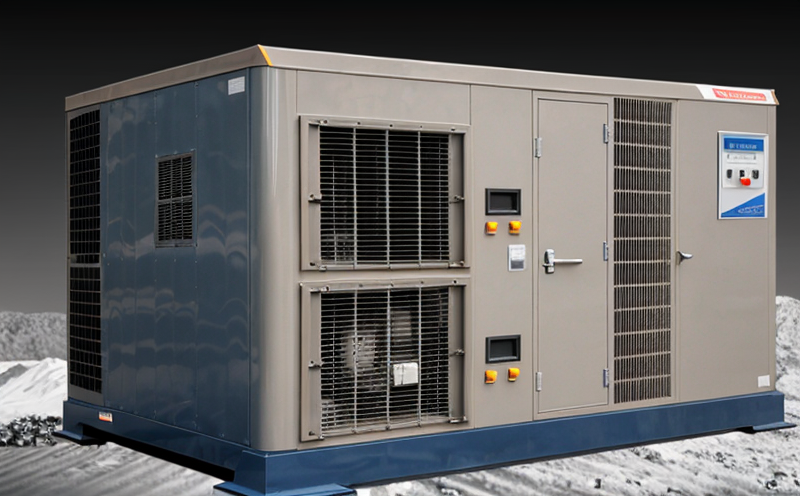JEDEC JESD22-A150 Voltage Overshoot with Thermal Stress Testing
The JEDEC JESD22-A150 test method is a critical procedure used in the semiconductor and microchip industry to evaluate the robustness of electronic components under extreme conditions. This test simulates real-world operating environments where voltage overshoots occur concurrently with significant temperature fluctuations, which can lead to premature failure or degradation of the device's performance.
The primary goal of this testing is to ensure that the semiconductor devices meet stringent reliability requirements set forth by industry standards such as JEDEC JESD22-A150. This standard defines a comprehensive series of tests designed to stress components beyond their normal operating conditions in order to uncover latent defects or design weaknesses.
During the test, the target specimen is subjected to rapid changes in temperature while experiencing high-voltage surges. The environmental chamber simulates both cold and hot cycles, creating a realistic stress scenario that mimics actual field usage. This combination of thermal cycling and voltage overshoots helps identify potential issues such as dielectric breakdown, solder joint fractures, or mechanical failures that could arise under these conditions.
The JEDEC JESD22-A150 test is particularly important for high-reliability applications like aerospace, automotive electronics, and military-grade equipment where even minor defects can have catastrophic consequences. By identifying weak points early in the development process through rigorous testing, manufacturers can improve product quality, enhance overall system reliability, and ultimately reduce warranty costs associated with premature failures.
In addition to detecting immediate failures, this type of testing also provides valuable insights into long-term performance characteristics by accelerating aging processes that might not otherwise be evident during shorter duration tests. This allows engineers to make informed decisions about component selection, packaging design improvements, and material choices based on empirical data rather than guesswork.
It is worth noting that the JEDEC JESD22-A150 test requires specialized equipment capable of delivering precise control over temperature and voltage parameters. The environmental chamber must be able to maintain tight tolerances for both variables throughout multiple cycles, ensuring accurate replication of real-world conditions. Proper specimen preparation is crucial as well; components need to be mounted correctly on the appropriate carrier boards before being introduced into the test environment.
The results from this testing are typically reported in terms of pass/fail criteria established by the relevant standard. Pass/fail decisions may also take into account other factors such as leakage current levels, capacitance variations, or changes in electrical resistance over time. These metrics provide a quantitative measure of how well the device withstands the applied stresses.
Compliance with JEDEC JESD22-A150 is often required by customers specifying high-reliability components for critical applications. By offering this service, we help our clients meet these demanding requirements while ensuring they receive products that can be trusted to perform reliably under challenging conditions.
Why It Matters
The JEDEC JESD22-A150 test is essential for several reasons:
It ensures the reliability of semiconductor devices in demanding environments where both thermal and electrical stresses are significant.
By simulating real-world conditions, it helps identify potential weaknesses that might not be apparent during other types of testing.
The data generated from these tests allows manufacturers to optimize their designs for better performance and longer life.
Compliance with this standard is crucial for meeting the expectations of key customers who specify high-reliability components for mission-critical applications.
In today’s competitive market, where product reliability directly impacts brand reputation and customer trust, the ability to demonstrate adherence to recognized industry standards like JEDEC JESD22-A150 becomes an important differentiator. Our clients benefit from knowing that their products have been rigorously tested according to these stringent guidelines.
Customer Impact and Satisfaction
The impact of successful JEDEC JESD22-A150 testing on customer satisfaction is substantial:
Customers receive components that are proven to withstand harsh operational environments, thereby enhancing their confidence in the quality of the product.
Meeting regulatory and contractual requirements reduces the risk of non-compliance penalties or disputes with clients.
The successful outcome of this test can contribute positively to customer relationships by demonstrating a commitment to excellence in manufacturing processes.
Products that pass these tests often command higher market prices due to their perceived superior quality and reliability, which translates directly into increased revenue opportunities for our clients.
In summary, the ability to offer reliable JEDEC JESD22-A150 testing not only meets but exceeds customer expectations, fostering long-term partnerships based on trust and satisfaction. Our laboratory’s expertise in this area ensures that we deliver consistent results that align with industry best practices.
Use Cases and Application Examples
Aerospace electronics: Ensuring that avionics systems can operate reliably despite extreme temperature fluctuations during launch and re-entry phases.
Automotive components: Verifying the durability of sensors, controllers, and other critical parts in vehicles exposed to wide ranges of temperatures.
Military-grade equipment: Providing assurance that communication devices and power supplies will function properly under field conditions characterized by rapid temperature changes.
Consumer electronics: Guaranteeing the longevity of portable devices like smartphones and tablets, which are subjected to varying ambient temperatures during use.
Data center infrastructure: Confirming that servers and networking equipment can continue operating optimally even when faced with unexpected spikes in power consumption leading to voltage overshoots.
These examples illustrate just a few of the ways JEDEC JESD22-A150 testing plays a vital role across various sectors. By incorporating this rigorous testing into their quality assurance programs, manufacturers can enhance product performance and extend service life, ultimately delivering greater value to end-users.





